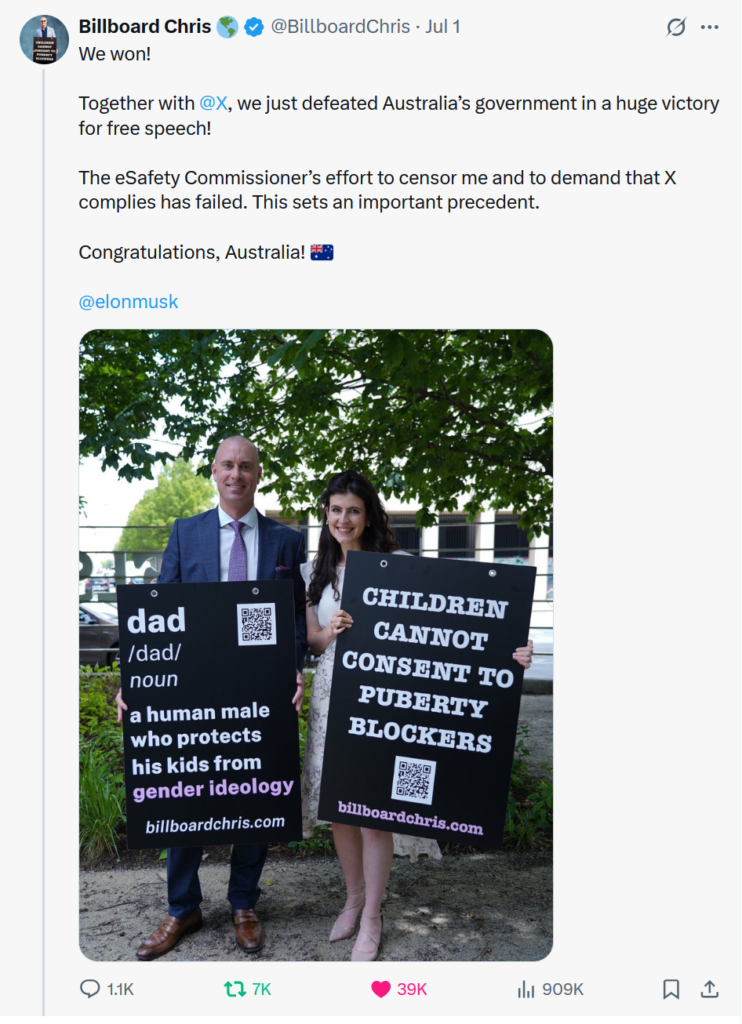The erosion of sex-based rights & a free speech victory that fought back

July 1, 2025, marked a flashpoint in Australia’s sex wars with the commencement of the Equality Legislation Amendment (LGBTIQA+) Act in New South Wales (Equality Act).
Hailed by its proponents as a triumph for diversity, equity, and inclusion, the law has triggered alarm among those fighting to defend women’s rights, biological truth, child safeguarding, and family autonomy.
In the Jubilee Room of NSW Parliament, gay Independent MP for Sydney, Alex Greenwich, stood beaming with a rainbow-flag cake, surrounded by trans activists, Equality Australia staff including long-time transactivist Teddy Cook, and a bevy of useful ‘transmaids’. The symbolism was hard to miss. Just two years earlier, the same room hosted Why Can’t Women Talk About Sex? – a forum stormed by transactivists as nine women shared harrowing accounts of what gender ideology had cost them. That room, once a space for truth-telling and resistance, now served as the stage to celebrate the formal dismantling of women’s sex-based rights in NSW law.
Redefining Reality
Among the sweeping changes in the Act is the removal of biological sex as a fixed legal category. Adults can now change the sex recorded on their birth certificate by completing a statutory declaration and nominating any ‘sex descriptor’ not deemed ‘offensive’ or ‘contrary to public interest’. There is no longer a requirement for medical intervention or even a diagnosis of gender dysphoria. Children under 18 can also have their sex marker altered with court approval or parental application, provided a ‘qualified counsellor’ attests to their decision and the child has received ‘counselling’.
The implications are profound: the law now allows individuals to alter official sex markers based solely on self-identification, untethered from biological reality. This shift effectively sidelines sex-based rights in critical areas such as women’s sport, prisons, and single-sex spaces. It also empowers the state to intervene in families where a child adopts a trans identity and their family do not affirm it – raising serious concerns about parental rights and state overreach.
Surrogacy, Exploitation, and Commodification
Another major shift – largely ignored by the mainstream media – is the effective decriminalisation of both pimping and international commercial surrogacy for NSW residents. Under the new law, courts can now grant parentage orders for overseas commercial surrogacy arrangements, where previously only altruistic surrogacy was permitted. Rebranded as ‘fertility equity’, the change has been strongly backed by LGBTIQA+ advocates, particularly gay men seeking biological children. Simultaneously, the offence of living off the earnings of prostitution has been repealed – freely enabling pimps and brothel owners to profit from the misery and exploitation of prostituted and trafficked women. Critics argue these amendments not only enable the outsourcing of reproductive labour to economically vulnerable women abroad, but also normalise the commodification of women’s bodies – undermining long-standing protections for mothers, children, and the sexually exploited.
Greenwich’s War on Women
Alex Greenwich has claimed to be a champion of women’s rights, but his actions tell a different story. In 2019, he led the Abortion Law Reform Act, which stripped all references to sex-based language in favour of gender-neutral ‘persons’ – a symbolic erasure of women from legislation centred on female biology that many saw as a symbolic foreshadowing of things to come. More recently, he publicly supported a biological male receiving Sydney’s Woman of the Year award – an endorsement that caused outrage amongst those who saw it as an affront to female recognition and achievement.
Now, with the Equality Act, Greenwich has led the charge in removing legal distinctions based on biological sex altogether. Framed as inclusive and progressive, the legislation effectively dismantles sex-based protections, allowing any male who ‘identifies as’ a woman to appropriate language, and access spaces and rights once reserved for females. For someone who claims to stand for women, Greenwich has consistently backed policies that many argue erode the lawful, sex-based rights of females.
A Mixed Victory
On the very day the Equality Act came into force in New South Wales, Canadian activist Chris Elston – widely known as ‘Billboard Chris’ – won a landmark victory against Australia’s much-lambasted eSafety Commissioner. The initial eSafety complaint, filed by transactivist Teddy Cook, targeted Elston’s reposting on X (formerly Twitter) of a Daily Mail article. At the time, Cook had been appointed to a contentious World Health Organisation advisory panel on trans health. The Commissioner issued X Corp with a takedown notice, claiming the post constituted ‘cyber abuse’ and threatening X with a fine of A$782,500; this attempt at state censorship even drawing opprobrium from the United States’ Department of State.

Billboard Chris and X Corp successfully challenged the notice – the Australian Administrative Review Tribunal dismissed nearly all of the Commissioner’s arguments, criticising one of her expert witnesses as ‘unconvincing’ and ‘difficult to draw any assistance from’ while the opinion of another was deemed ‘useful’ but not to the standard of admissible expert evidence.
This was a pivotal win for free speech – achieved not through institutional backing and apparently limitless government funding, but the hard slog of crowdfunding, grassroots advocacy, and pro-bono legal support in conjunction with ADF International. Yet the victory may be short-lived. Under the newly enacted Equality Act, similar commentary could now fall foul of provisions that criminalise or penalise criticism of LGBTIQA+ ideology. One clear example is the prohibition on ‘outing’ a person’s sex or gender history – even when that individual occupies a public role or receives taxpayer funding. While the eSafety Commissioner’s censorship powers were pushed back in the Tribunal decision, the Equality Act creates and fortifies pathways to silence dissent – via anti-discrimination tribunals or criminal prosecution, all backed by the force of state law.
Silencing Dissent?
Under the amended Crimes (Domestic and Personal Violence) Act, ‘outing’ someone’s gender history without consent – even in the context of public debate – may now be classified as intimidation or domestic and personal violence. The line between criticism and criminality is blurred, and the risk of being dragged before an anti-discrimination tribunal, sued, or even arrested looms large for those who speak against gender ideology.
Advocates like Kirralie Smith of Binary Australia know this all too well. Smith has been subject to repeated litigation simply for defending women’s sport and biological boundaries. As she has experienced, often ‘the process is the punishment’ – a reality that may now befall others under the expanded anti-discrimination framework.
The Rise of the Activist Class
Figures like Teddy Cook – formerly of ACON and now with Equality Australia – epitomise the rise of the professional activist. As the initial complainant in the eSafety Commissioner’s failed case against X Corp and Billboard Chris, Cook has wielded considerable influence in shaping trans-positive public policy. Organisations such as ACON (formerly the AIDS Council of NSW), where Cook previously worked, received over $20 million in public funding last financial year. Far from operating as independent advocacy groups, it is my view that these bodies increasingly function as ideological extensions of the state – lobbying for legal reform, producing government-backed education campaigns, and steering public institutions, all while benefiting from charitable status and minimal public accountability.
This lack of transparency is concerning. In the author’s own experience, even basic requests for information about who is consulted on trans-inclusive policies – particularly those that override sex-based rights and carry sweeping social consequences – have been stonewalled by government bodies invoking vague claims of ‘potential harm’. Yet it is entirely reasonable for the Australian public to know who is shaping policy and legislation, especially when those individuals or organisations are publicly funded and influence critical sectors like healthcare, education, and legal reform. Accountability should never be sacrificed in service of ideological protection.
The Road Ahead
Billboard Chris’ win is a rare and welcome reprieve – but it stands in stark contrast to the broader legislative trend in New South Wales. The overhaul of anti-discrimination law through the Equality Act heightens legal risks for critics, entrenches gender ideology within state institutions, and continues to erode rights grounded in biological sex. And the battle is far from over. Next month, Sall Grover – CEO of the women-only app Giggle for Girls – will appear before the Full Court of the Federal Court of Australia to appeal a lower ruling that found she had indirectly discriminated against a biological male removed from her platform. That outcome could either entrench the legal privileging of gender identity over biological sex or mark a critical turning point in the fight to restore sex-based rights (follow Sall’s fight here).
As rainbow activists celebrate what they claim is progress, many others mourn a quieter but devastating loss: the right to speak freely, to safeguard children, and to assert a simple truth – women are real, and sex still matters.
Katherine Deves is a solicitor at Pryor Tzannes & Wallis Solicitors and a director of Common Sense Defence, a fighting fund established to back ordinary Australians against authoritarian lawfare and defend fundamental freedoms through legal action, political advocacy and community mobilisation.
Source: Spectator Australia
